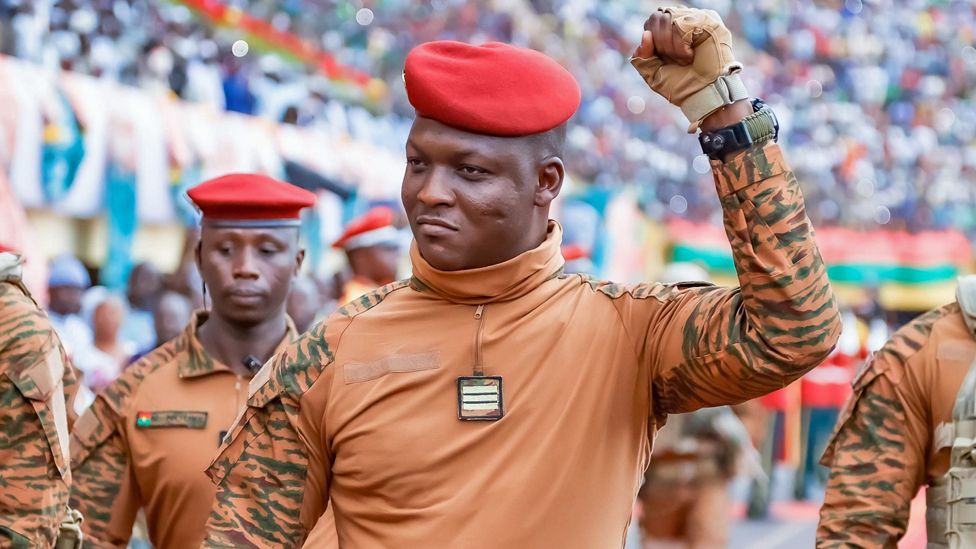Capt Ibrahim Traoré: Why Burkina Faso’s Junta Leader Has Captured Hearts and Minds Around the World
At 37 years old, Capt Ibrahim Traoré, the military leader of Burkina Faso, has emerged as a significant figure in the realm of African leadership. His approach combines elements of pan-Africanism, as he positions himself as a liberator from what he terms Western imperialism and neo-colonialism. With a compelling narrative reflecting the struggles of many across the continent, Traoré has garnered admiration as a modern-day icon akin to the heroic figure of Thomas Sankara, Burkina Faso’s revolutionary past leader, sometimes likened to “Africa’s Che Guevara.”
Beverly Ochieng, a senior researcher at Control Risks, emphasizes Traoré’s substantial influence, noting, “He is resonating with the youth of Africa, who are increasingly questioning their relationship with the West amid persistent poverty in a resource-rich context.” This sentiment has grown notably since Traoré took power in a 2022 coup, leading a significant shift in Burkina Faso’s foreign alliances, moving away from former colonial power France towards closer ties with Russia. His administration has embraced leftist economic policies, including the founding of a state-owned mining company that mandates foreign enterprises to allocate a 15% stake in local operations to Burkinabé citizens, along with knowledge transfer commitments.
Radical Reforms and Growing Popularity
Traoré’s reforms have effectively positioned him as a symbol of hope for many Africans disillusioned with Western democracy. His stance on resource management, which includes initiatives such as creating a gold refinery and establishing national gold reserves, aligns with his vision of economic self-sufficiency. However, challenges for Western companies remain evident, as Sarama Resources, an Australian firm, has initiated arbitration against the Burkinabé government for the revocation of its exploration license.
Enoch Randy Aikins from the Institute for Security Studies notes Traoré’s unprecedented popularity, stating, “He has become Africa’s favorite leader.” This appeal is not purely organic; social media campaigns have played a crucial role in promoting Traoré’s image. Videos featuring AI-generated renditions of popular music stars praising him have contributed to his revolutionary branding, even though the authenticity of these endorsements remains questioned.
| Reform Initiative | Description |
|---|---|
| State-Owned Mining Company | Mandates foreign firms to allocate 15% stake to Burkinabé citizens. |
| Gold Refinery Construction | Establishing national gold reserves and a refinery for local processing. |
| Nationalization Efforts | Acquiring control over foreign-owned gold mines to boost local benefits. |
Despite his growing fame, Traoré’s regime faces significant challenges. His promise to address a decade-long Islamist insurgency remains unfulfilled, and his government has been criticized for suppressing dissent among critics, including journalists and civil society activists. Internationally, his methods have attracted skepticism, particularly from countries like France and the United States, pointing to a weathered relationship as European powers accuse him of forming an alliance with what they term neo-imperialist forces.
Traoré’s oratory skills and charismatic presence have made him a standout figure in international arenas. His recent participation in commemorations in Russia, where he echoed themes of revolutionary fervor against perceived imperialism, only bolstered his profile. Support from segments of the African diaspora, who see in him a voice fighting against the historical injustices of racism and colonialism, has further solidified his image as a progressive leader.
While Traoré’s future remains uncertain, the ripples of his leadership are felt across West Africa, challenging the status quo and inspiring movements. As he gains momentum alongside military leaders in countries like Mali and Niger, the impact of his governance approach will be watched closely, with the potential to reshape political norms in the region profoundly.


